Reredos
A reredos (/ˈrɪərˌdɒs, ˈrɪərɪ-, ˈrɛrɪ-/ REER-dos, REER-ih-, RERR-ih-) is a large altarpiece, a screen, or decoration placed behind the altar in a church. It often includes religious images.
| Look up reredos in Wiktionary, the free dictionary. |
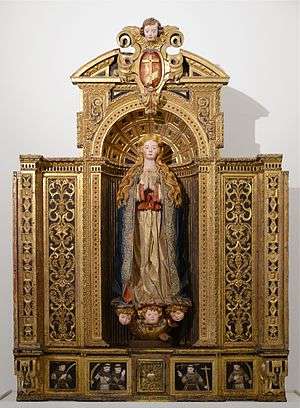
Description
A reredos can be made of stone, wood, metal, ivory, or a combination of materials. The images may be painted, carved, gilded, composed of mosaics, and/or embedded with niches for statues. Sometimes a tapestry or another fabric such as silk or velvet is used.
Terminology
The term reredos is sometimes confused with the term retable. While a reredos is generally placed on the floor behind an altar, a retable is placed either on the altar or immediately behind and attached to the altar. In French (and sometimes in English by confusing the terms), a reredos is called a retable; in Catalan a retaule, in Spanish a retablo, etc. Reredos is derived through Middle English from the 14th century Anglo-Norman areredos, which in turn is from arere behind +dos back, from Latin dorsum. The term referred generally to an open hearth of a fireplace or a screen placed behind a table. Used in the 14th and 15th centuries, reredos had become nearly obsolete until revived in the 19th century.
A reredos differs from a retable in its size and positioning; while a reredos typically rises from ground behind the altar, the retable is smaller and stands either on the back of the altar or on a pedestal behind it. Many altars have both a reredos and a retable."[1] But this distinction may not always be observed. The retable may have become part of the reredos when an altar was moved away from the wall. For altars that are still against the wall, the retable often sits on top of the altar, at the back, particularly when there is no reredos (a dossal curtain or something similar is used instead). The retable may hold flowers and candlesticks.
The term reredos may also be used for similar structures, if elaborate, in secular architecture, for example very grand carved chimneypieces.[2]
Examples from various churches
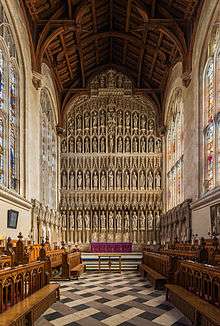 New College, Oxford Chapel reredos, UK
New College, Oxford Chapel reredos, UK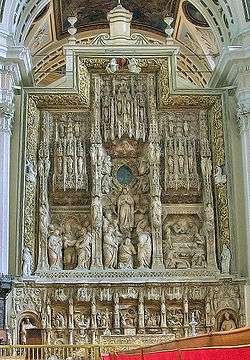 Altar of The Basilica of Our Lady of the Pillar in Zaragoza
Altar of The Basilica of Our Lady of the Pillar in Zaragoza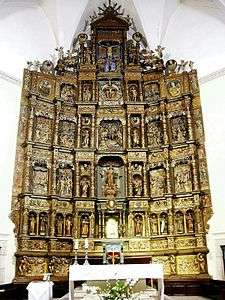 Iglesia de Nuestra Señora de la Asunción, Tarancón.
Iglesia de Nuestra Señora de la Asunción, Tarancón.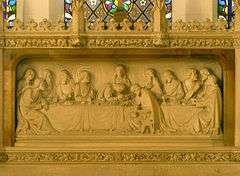 Holy Trinity Church, West Bromwich, war memorial for World War I.
Holy Trinity Church, West Bromwich, war memorial for World War I.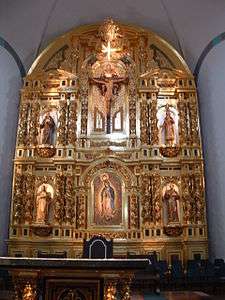 The "Grand Retablo," Mission Basilica San Juan Capistrano.
The "Grand Retablo," Mission Basilica San Juan Capistrano.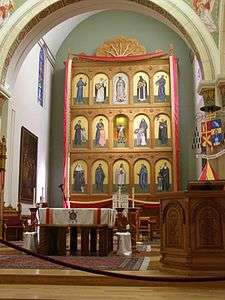 Cathedral Basilica of St. Francis, Santa Fe, New Mexico
Cathedral Basilica of St. Francis, Santa Fe, New Mexico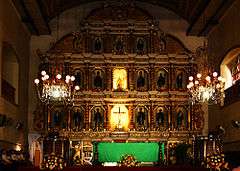 Main altar "retablo" of the Basilica Minore del Sto. Niño in Cebu City, Philippines
Main altar "retablo" of the Basilica Minore del Sto. Niño in Cebu City, Philippines- Plain altarpiece painting
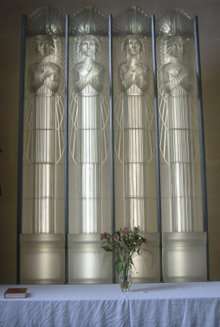
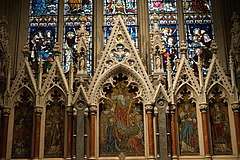 Grace Church in New York Reredos, Grace Church (Manhattan).
Grace Church in New York Reredos, Grace Church (Manhattan)._en_Morelia%2C_Michoac%C3%A1n_(6011826833).jpg)
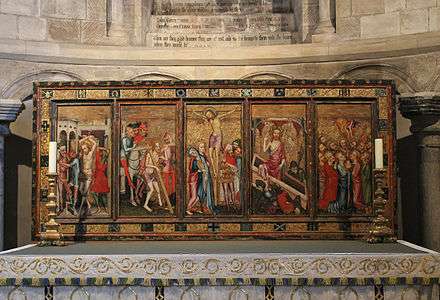 Despenser reredos, Norwich Cathedral, England.[4]
Despenser reredos, Norwich Cathedral, England.[4]
See also
References
- Art & Architecture Thesaurus Online "Retable"
- "Reredos", Baca, Murtha, and Visual Resources Association, Cataloging Cultural Objects: A Guide to Describing Cultural Works and Their Images, 2006, American Library Association, ISBN 0838935648, 9780838935644
- "TEMPLO DE SANTA ROSA DE LIMA (TEMPLO DE LAS ROSAS)". michoacan.travel.
- Beckwith, Sarah (1996). Christ's Body: Identity, Culture and Society in Late Medieval Writings. London: Routledge. p. 22. ISBN 978-0415144261. Retrieved 17 December 2019.